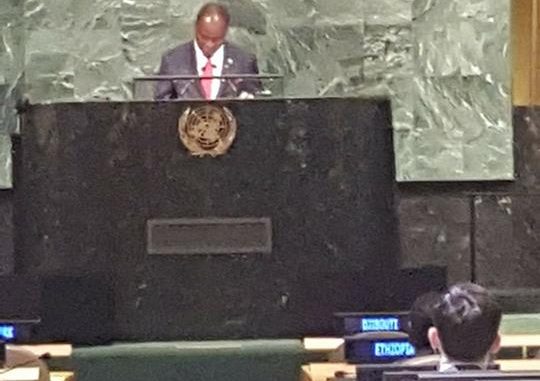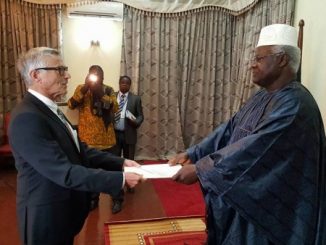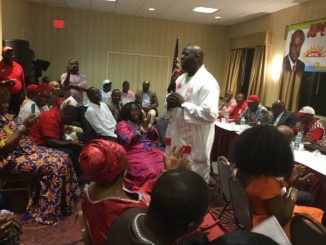
STATEMENT of HIS EXCELLENCY DR. ERNEST BAI KOROMA
President of the Republic of Sierra Leone
at the
Seventy-Second Regular Session of the
United Nations General Assembly
On the Theme:
“Focusing on People: Striving for Peace and Decent Life for All on a
Sustainable Planet”
delivered by
H.E. Dr. SAMURA M.W. KAMARA
Minister of Foreign Affairs & International Cooperation
Thursday 22nd September 2017
New York
Mr. Secretary General
Your Excellencies, Heads of State and Government
Distinguished Ladies and Gentlemen
I bring you fraternal greetings and very best wishes from His Excellency Dr. Ernest Bai Koroma, President of the Republic of Sierra Leone. President Koroma deeply regrets that he is unable to participate in this 72nd Session of the General Assembly due to unavoidable circumstances. He has however instructed me to deliver to you this message from him, and I quote:
“I congratulate you, Mr. President, on your assumption of responsibility to direct the work of the Seventy-Second Session of the General Assembly, and to assure you of my personal and country’s support throughout your tenure. Let me also congratulate and warmly welcome our new Secretary-General, Mr. António Guterres.
I want to commend and thank your predecessors, Mr. Peter Thomson and Mr. Ban Ki-moon respectively for their distinguished leadership and outstanding commitment to advancing our collective ambitions and energy to maintaining global peace and security as well as achieving sustainable development and climate change for all.
I look forward to working with you in upholding and fulfilling our objectives as set out in our United Nations Charter.
Mr. President,
Let me particularly commend the United Nations for its significant contribution to restoring peace, security, stability and economic reconstruction in my country, Sierra Leone, during our very trying times of war and its aftermath. I am happy to note that today, Sierra Leone is described by the United Nations through its Peace Building Commission as a proud storehouse of lessons for a seamless transition from war to peace, democracy and stability. These lessons have provided us with valuable and cost-effective tools for the peaceful settlement of disputes and conflict prevention. We have always been more than ready and willing to share them with other countries in a similar plight, especially within our membership of the g7+ group of post-conflict countries who are striving to exit fragility and promote resilience.
Mr. President,
The choice of the theme for this Session: “Focusing on people: striving for peace and a decent life for all on a sustainable planet”, is apt and timely in an era of global uncertainties and challenges, including the emergence of new threats that tend to undermine our efforts in ‘the promotion of the economic and social advancement of all peoples’. For seventy-two years, through this organization, we have combined our efforts to prevent a major war, promote human rights and fundamental freedoms, justice and equal rights of men and women of all races. Yet, we are faced with unprecedented global challenges of enormous proportions. The seemingly unending cycles of conflict and violence, the destructive and devastating impacts of climate change, the spread of terrorism and the largest refugee, migration and humanitarian crises in recent history continue to question the effectiveness of our present international machinery, as well as our ability to promote peace and decent life for all on a sustainable planet. We should therefore generate innovative ideas and credible mechanisms that will bring all conflicts to a peaceful end; promote social progress, peace and security, human rights and fundamental freedoms; and secure better standards of life for humanity. We must remain steadfast to our commitment to building a sustainable planet for present and succeeding generations. This Assembly should in that regard, reflect on reform measures that will reinforce our collective obligation to upholding the purposes and principles upon which our organization was founded.
Mr. President,
Two years ago, this Assembly adopted the groundbreaking resolution 70/304 on strengthening the role of mediation in the peaceful settlement of disputes. It is Sierra Leone’s firm belief that we must continue to build on gains made in our preventive diplomacy efforts, including heightened collaboration with each other, and among our regional organizations and actors, making use of experiences that have helped us achieve relative international peace and security. I am in that regard, heartened by the profound impetus of the preferential use of preventive diplomacy, as well as mediation efforts in the maintenance of international peace and security by the UN system. The good offices of the Secretary General, including the early warning system, and the international contact groups are important instruments in our pursuit to prevent conflict and must be further strengthened to effectively respond to any crisis situation. The effective utilization of Chapter VI of the Charter therefore remains the best option for this Organization in the prevention and peaceful settlement of disputes.
Obviously, mediation remains a powerful instrument for the prevention and settlement of armed conflicts and must be utilized to the fullest extent possible. My country has indeed benefited from mediation efforts under the auspices of the United Nations and ECOWAS. We have learned from experience that for mediation efforts to be fruitful, they must embrace such measures as the timely cessation of hostilities, credible cease-fire agreements and the timely deployment of peacekeeping and/or observer missions to undertake and supervise disarmament, demobilization and re-integration of ex-combatants.
Furthermore, the role of regional organizations in partnership with the United Nations must be further strengthened to ensure greater response at the regional level in implementing preventive measures such as early warning mechanisms. Regional organizations are usually better positioned to generate the necessary political will for conflict prevention within their regions. The role of the Peacebuilding Commission has been exemplary and the experience, expertise and knowledge that exist within its work in preventing countries from relapse should be tapped to prevent conflict from escalating into violence or war. In this regard, we encourage the sharing of the experiences gained and lessons learned by PBC-country configurations.
Mr. President,
Since I assumed the leadership of Sierra Leone almost ten years ago, the country continues to make steady progress, particularly in the priority sectors of infrastructure, human development, agriculture and food security, democracy, international relations and inclusive governance, as outlined in my medium-term development plans, the “Agenda for Change”, followed by the “Agenda for Prosperity”. These transformative strategies have gone a long way in repairing and healing more visibly the damage and scars resulting from a brutal war, while also charting out the path for achieving sustainable socio-economic development and shared prosperity, and more particularly, for transforming Sierra Leone into a Middle Income country by the year 2035.
Mr. President,
Three years ago, in 2014, the unexpected and unprecedented outbreak of the Ebola Virus Disease substantially wiped out the social and economic gains which Sierra Leone had painstakingly achieved over 10 years of progressive post- conflict reconstruction effort. Shortly after being recognized as one of the countries with the highest growth rate in the world, our economy plunged very sharply, from record high GDP growth rates of 15.2% and 20.1% in 2012 and 2013 respectively, to record low rates of 4.6% and minus 21.7% in 2014 and 2015 respectively. The epidemic revealed fundamental systemic weaknesses that had remained to be addressed in post conflict Sierra Leone, especially in the health care system. The fight to end, eradicate and prevent the re-occurrence of the Ebola Virus Disease was largely achieved through a strong leadership community ownership and national resilience.
Mr. President
While we were on the verge of turning the corner in our post Ebola recovery strides, Sierra Leone was severely hit in the early hours of 14th August, this year, by torrential rainfall, leading to flash flooding in several areas of the capital city, as well as the collapse of the hillside of Mount Sugar Loaf, overlooking Freetown and its environs, causing wide spread devastation. The impact was heart rendering, especially for women and children who were most affected. Over five hundred lives were lost; several persons were severely injured and traumatized; more than six hundred persons remain missing; about seven thousand persons were rendered homeless; and physical property and assets worth an estimated thirty million United State dollars lost. This year’s rainfall is the third in a series of heavy torrential rains with devastating impact, most times on vulnerable groups in our cities: displacing hundreds of people, destroying farm land, businesses, properties and costing lives. These disasters are a stark reminder that climate change is real. They also demonstrate the level of Sierra Leone’s vulnerability to climate change.
Let me once again, seize this opportunity to thank the international community for its support during these moments of grief and need, without which I could not have been counting the successes I am proudly reporting today.
Mr. President,
Under my leadership, Sierra Leone has enhanced political stability by strengthening institutions and laying the basis for good governance, allowing the institutions sufficient leverage and latitude to deliver on their respective statutory mandates. My Government has recorded significant milestones in the areas of gender equality and women empowerment as well as in promoting youth employment and empowerment. We have established a more stable and regulatory environment for investment and wealth generation, which in the medium and long term will create employment opportunities for inclusive socio-economic development of the youth, the disabled, and women. My Government’s programmes on local government and decentralization have provided greater space for wider and deeper community participation in our development trajectory. Furthermore, the launch of the Open Government Initiative in 2008, followed by our membership of the Open Government Partnership in 2014, have together created an effective platform for transparent governance and citizens empowerment, thereby building trust and confidence between my Government and the People.
Mr. President,
With these developments, Sierra Leone is now on a solid path and will continue to consolidate the transition from war to peace, shore up democratic credential, inclusive growth and a decent life for all.
Learning from the EVD outbreak, my Government is building a resilient health system that will be positioned to prevent, detect, and respond to any public health threat of either the same or of similar nature. We have established public health laboratories nationwide, which do have full capabilities to test for viral hemorrhagic fevers, including Ebola. The floods and mudslides are pointing to a greater emphasis on the environment, land management, afforestation, affordable housing, urbanization, and slums upgrade.
The response of the international community in providing support and show of solidarity with us has been unprecedented and Sierra Leoneans do appreciate your kind and timely interventions. We have remained determined to accelerate the positive transformation of Sierra Leone, ensuring that Sierra Leoneans benefit from the dividends of our well-earned peace and democracy. We therefore look forward to more strategic engagement with our partners in effectively implementing the SDGs in Sierra Leone, especially in diversifying our economy with a focus on agriculture, fisheries, tourism, and manufacturing industries, as well as investment in education and health. Economic potentials remain enormous in these resourceful sectors for public-private partnerships, south-south, north-south and triangular cooperation.
Mr. President,
Sierra Leone is getting prepared for another cycle of Presidential, Parliamentary and Local Government elections, which also marks the end of my second and final term as President of Sierra Leone. We have previously held three highly successful and widely acclaimed peaceful, free and fair democratic elections following the end of the civil conflict. Those are milestones that significantly demonstrate our exemplary performance in the consolidation of peace and security. The elections to be held will not be different in transparency, fairness and credibility.
I will be leaving office with the sincere hope that successful implementation of the projects and programmes I have laid out will enhance Sierra Leone’s attainment of the Sustainable Development Goals. I will continue to roll out my Government’s development agenda even more robustly, including an energy revolution, embarking on massive nationwide implementation of much needed solar mini grids aimed at providing energy to our remote areas. There is serious effort to digitalize the country as an enabler of accelerated development. It is my fervent hope that this momentum and development trajectory, defined by transformative strategies and catalytic actions, will be maintained with your sustained partnership with my successor. I therefore thank all development partners, both at the bilateral and multilateral levels, who have collaborated with us to support the strides we have achieved during my tenure.
Mr. President
As Coordinator of the African Union Committee of Ten Heads of State and Government on the Reform of the UN Security Council, I would like to end my remarks by reiterating Africa’s concern regarding the slow pace of the reform process. We have heard this concern expressed by the current Chair of the African Union, His Excellency Professor Alpha Conde, President of the Republic of Guinea as well as by several other Heads of State and Government.
Mr. President,
Beyond the compelling urge to correct the historical injustice done to Africa, we must strongly reflect on the present geo-political realities which generally compel the reform and modernization of the UN system, particularly the Security Council. We must also reflect on the Continent’s numerical strength, its growing economic power, its population dynamics, and its increasing role in the multilateral system. Against this background, Africa’s demand, as articulated in the Ezulwini Consensus and Sirte Declaration, is therefore even more legitimate, and ought to be redressed and treated on the basis of equity in the global governance system.
In conclusion, Mr. President, as we look at the work that lies ahead, let us not lose sight of our shared obligation in ensuring a peaceful and secure world by resolving our differences, including national and international disputes, through constructive dialogue. We must respect and prioritize strengthening the existing mediation mechanisms provided in the Charter.
I am convinced that the pace of global development and the achievement of peace and security will be significantly accelerated if we appreciate the wisdom in redirecting resources from the current nuclear arms race to people-centered development. This will benefit mankind more than continuing the competition for superiority at our detriment. It will also facilitate the attainment of our desired twin goals of sustainable peace and development.
I thank you for your attention”.



